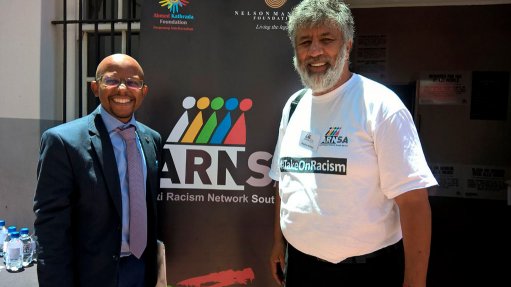
Sello Hatang and Neeshan Balton
Photo by: Sane Dhlamini
The Fees Must Fall movement mirrors the actions of youth of the 70s and 80s and is a depressing continuation of the trauma that South Africa inflicts on its youth, said Nelson Mandela Foundation CEO Sello Hatang.
He was addressing the second Anti-Racism Network of South Africa conference on Tuesday, cohosted by the Ahmed Kathrada Foundation and the Nelson Mandela Foundation at Constitutional Hill.
Ahmed Kathrada Foundation executive director Neeshan Balton said the anti-racism conference was about building “a catalogue of practice”, so that delegates would be better equipped to apply their knowledge in the communities they represented.
Hatang, meanwhile, stated that in the foundation’s youth dialogue work, it had encountered growing frustration on university campuses.
He pointed out that University of Free State students had suggested that “if the university was the ATM, the black students had cards which the machine could not read”.
As pointed out by many analysts, Hatang said, the fees protests and the experiences of students could not be analysed in isolation.
“We have all come to understand that something fundamental has broken in our system, and whilst we try to patch up the cracks and the faults with little wins and quick fixes, we need to realise that the structure needs to be overhauled, reworked and remodelled,” he explained.
“When youth voices called out for cathartic burning, it was because attempts at transformation had, for the most part, failed miserably,” Hatang stated.
“We need to realise that many of our actions and policies are not progressive and that they are both anti-poor and anti-black and are a continuation of the legacy of apartheid and colonialism,” he said.
Hatang highlighted that problems such as the unaffordability of student fees, income inequality, poverty and gender-based violence were caused and facilitated by centuries of racism within the country, as well as internationally, and that it continued due to serious mismanagement and ideological blinkers.
He said as a foundation that was working tirelessly to continue the legacy of Nelson Mandela, it had to account for anti-racism work in all its actions.
“While many South Africans decry the rainbow nation and nonracialism and call for its end, we should think why Madiba and uncle Kathy and all our elders fought for this ideal. We must remember that this ideal, this dream was something that we should strive for,” Hatang stated.